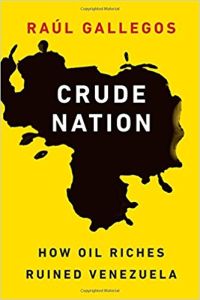Join getAbstract to access the summary!

Join getAbstract to access the summary!
Raul Gallegos
Crude Nation
How Oil Riches Ruined Venezuela
Potomac Books, 2016
What's inside?
Journey into the bizarre world of Venezuela’s oil-deranged economy.
Recommendation
These days, the headlines from Venezuela are all about starvation, riots and political persecution. How did such a fate befall a promising, once prosperous country? In this artfully written dispatch, former journalist Raúl Gallegos examines Venezuela’s dysfunctional economic past and present. He describes today’s deranged economy – where oil flows, but milk, toilet paper and tampons are scarce – and explores the flawed roots of Venezuela’s oil-based system. Gallegos conducted the bulk of his reporting in early 2015, when the situation was bad but not yet the calamity it later became. Gallegos delves into various bizarre realities, such as Venezuela’s shortages of basic consumer goods. His reporting is sharp, his writing crisp and his characters well drawn. Gallegos laments in a foreword that government officials refused to cooperate with his reporting. But it’s doubtful they would have revealed any useful insight. Gallegos focuses on topics readers will find intriguing – such as, how do human beings respond when buying something as rudimentary as toilet paper requires standing in line for hours? In Venezuela, people make do with paper towels, steal a roll from a restaurant or search for a black-market vendor. Gallegos has no sympathy for the Chávez-Maduro regime, so readers looking for a silver lining to Venezuela’s experiment with socialism must search elsewhere.
Summary
About the Author
Raúl Gallegos, senior analyst for the consulting firm Control Risks, was a featured columnist for Bloomberg View and an oil correspondent for Dow Jones and The Wall Street Journal.
















Comment on this summary